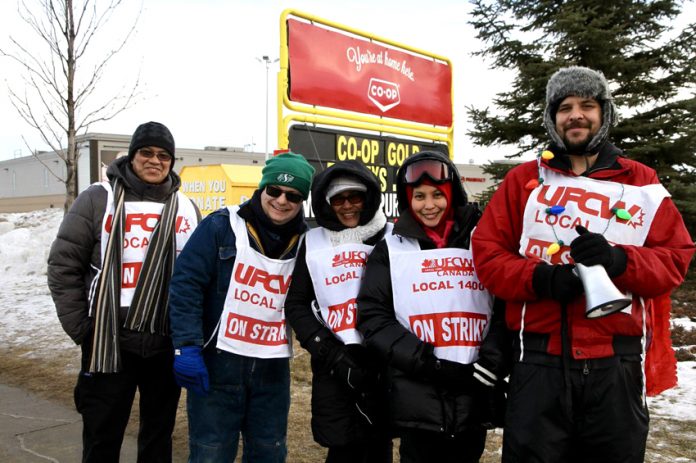LABOUR activists, community allies and family members came out in force to support UFCW Local 1400 members at Saskatoon Co-op on December 20. They were calling on Co-op CEOs Grant Wicks and Scott Banda to ‘Stop the Greed’ and negotiate a fair contract as part of a major solidarity rally.
Workers at Saskatoon Co-op were forced out on strike last November 1, after the company insisted on an offer that would slash many future employees’ wages by $8,000 per year.
UFCW 1400 members have told the employer they’re willing to negotiate a fair deal that reflects the needs of workers and the business. To that end they recently asked the Co-op to enter binding arbitration to reach an agreement that works for both sides.
But the company turned down the request, and continues to push its wage-slashing offer. Meanwhile, Federated Co-op CEO Scott Banda has failed to intervene in the matter, and has forced members to make an important stand for fairness.
At the Thursday rally, activists from UFCW Canada Locals 248P, 401, 649, 832, and 1518 joined Local 1400 members in front of the Federated Co-op headquarters in downtown Saskatoon for a giant solidarity rally in support of workers at the Co-op. Participants heard from UFCW Local 1400 President Norm Neault and UFCW Canada National President Paul Meinema, who called on Saskatoon Co-op to do the right thing and get back to the bargaining table.
Adding to their solidarity were many Co-op members, community allies, and activists from other unions and labour organisations, including the Teamsters, SEIU, the Saskatchewan Federation of Labour (SFL), and the Saskatoon and District Labor Council — all joining the call for a fair collective agreement at Saskatoon Co-op.
‘Saskatoon Co-op needs to realise that we’re serious about this, and we aren’t going to back down,’ said Co-op worker and UFCW 1400 member Amber Dunkley. ‘I’m striking so that if my daughter wants to work at Co-op when she gets a little bit older, she’ll be able to do that and will have the same fair pay as the other employees.’
‘Our fight is a universal one against corporate greed, and in defence of fairness and respect in all of our workplaces,’ UFCW 1400 President Norm Neault told rally participants. ‘While other jurisdictions and employers are implementing a living wage, Saskatoon Co-op is demanding serious roll backs for its workers. ‘Make no mistake – a roll back is a roll back whether it affects workers today or in the future,’ he added.
‘At a time when governments around the world are looking at ways to close wage gaps, the Co-op has lost its way and wants to widen the wage gap between current and future employees,’ said UFCW Canada National President Paul Meinema. ‘Today I want to tell members at the Co-op that the 250,000 members of UFCW Canada are behind you, and we support your fight for fairness.’
You can help support the campaign for fairness at Saskatoon Co-op by sending a message to the company telling them to Stop the Greed – and negotiate an equitable agreement that provides fair pay and treatment to all Saskatoon Co-op employees.
• Put 2018 in the rear view mirror ASAP for those trying to make money by doing journalism. Newspaper revenues are still sinking fast, say the NewsGuild and Writers Guild. Magazines are cutting, closing and changing hands. Nor are digital sites any longer up, up and away.
‘The vagaries of publishing on Facebook and other platform giants are zapping them, too. And that’s not to mention Facebook, Google and Amazon’s cookie monster gobbling digital ad revenue. Cause and effect or not, the NewsGuild and Writers Guild, by contrast, are having a banner year for organising and bargaining. NewsGuild president Bernie Lunzer is confident that lots more of the same is coming in 2019.
Here is how fast the action has become: • The Daily Hampshire Gazette and Valley Advocate, owned by Newspapers of New England, voted 40 to 29 for representation on Wednesday. • New York Magazine print and digital writers had 80 per cent backing in petitioning for recognition on Tuesday. Voluntary acceptance appears likely.
• At Slate, journalists who are represented by the Writers Guild rather than the NewsGuild, authorised a strike (not the same as actually striking) on Tuesday by a 52 to 1 vote.
Two differences in the new wave of organisation and bargaining stand out. Management at many of the publications – the Chicago Tribune, Los Angeles Times, The New Yorker and The Guardian (US) for example – have chosen not to oppose the effort and have accepted union certification without the delay and formality of an election.
Bitter management opposition to organising, deploying union-busting lawyers and PR firms was more the norm for much of the 20th century. It hasn’t disappeared, as detailed in a CJR story this week, but there is less of it.
Second difference: At digital sites, unionisation proceeds from a standing start. The group is so new that there is no history of union representation similar to what metro newspapers have had for many decades. That means unionising is a leap into the unknown for a New York- and Washington-centred workforce largely populated by millennials.
